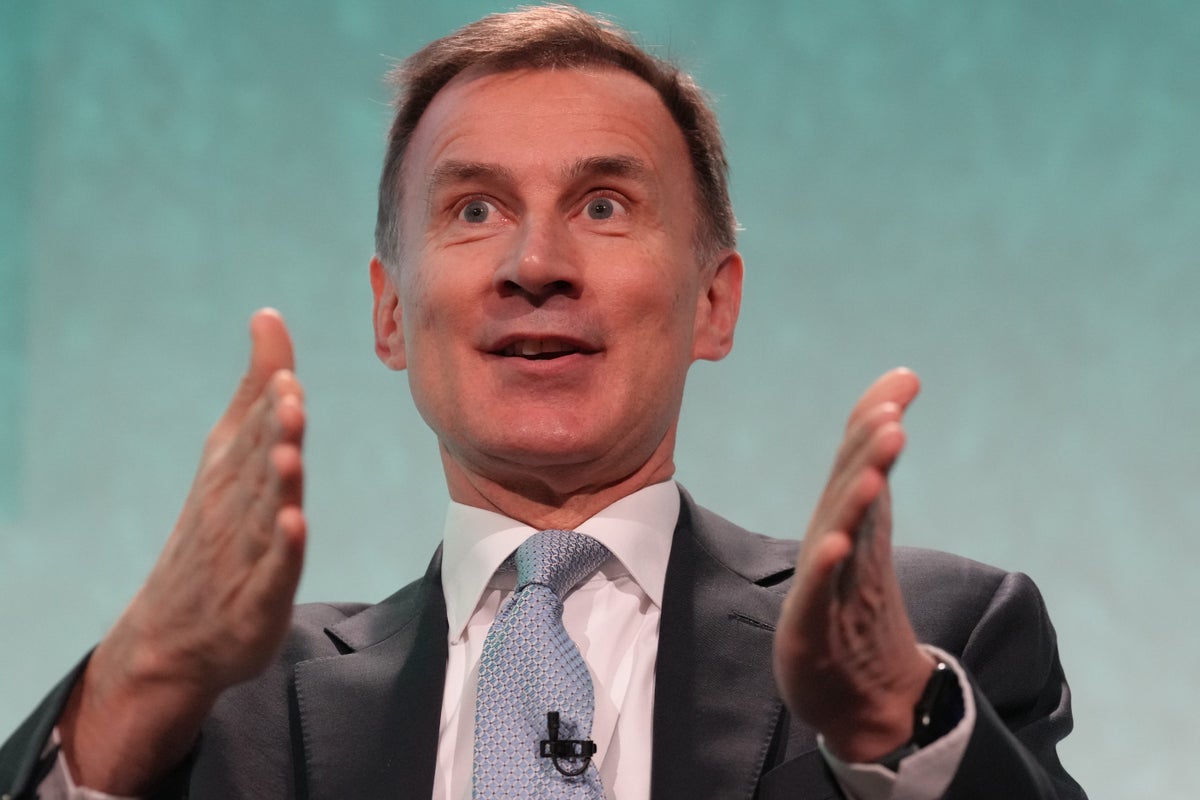
Chancellor Jeremy Hunt has said he is unsure if the government can afford to offer voters more cut taxes, as a national insurance reduction came into force on Saturday.
Rishi Sunak appeared to talk up the prospect of tax cuts earlier this week – insisting that he wanted to “do more” – as he revealed a general election would be held in the second half of 2024.
But Mr Hunt said he was not sure if he could afford to reduce taxes, despite the burden rising to the highest since the Second World War before the end of the decade.
“It’s the start of a process,” the senior figure told reporters on the 2 per cent national insurance cut. “As chancellor, if I can afford to go further I will, I don’t yet know if I can.”
The cut to national insurance from 12 per cent to 10 per cent comes as the government has frozen the income tax threshold, providing a de facto tax rise to millions.
However, Mr Sunak and Mr Hunt have been accused of giving tax cuts with one hand while taking with the other – as economists warn the impending cut will not ease the pressure because of the freezing of tax thresholds.
The respected Institute for Fiscal Studies (IFS) said that personal taxes are still set to rise, while the Resolution Foundation said the lowest paid will face the biggest hit.
Sunak and Hunt under pressure to offer more tax cuts before elction— (UK Parliament/AFP via Getty Images)
It came as Labour launched a poster campaign accusing Mr Sunak of offering a “raw deal” – claiming the PM has given £2 worth of tax cuts for every £10 taken.
Sir Keir Starmer’s party made the audacious move of taking out anti-government tax adverts on the ConservativeHome website – the “bible” for the Tory grassroots.
It has plastered the ads on a shopfront and ad van in Wellingborough, North Northamptonshire, where Labour is seeking to overturn a Tory majority in an upcoming by-election.
Ms Reeves said: “Working people know that this month’s tax con is just a cynical giveaway from a weak and out-of-touch Tory government that is desperate to cling onto power, rather than a credible plan to fix our broken economy.”
Labour’s Rachel Reeves said NIC changes were ‘cynical giveaway’— (PA)
Mr Hunt said the national insurance move will save the average worker £450 a year. He said the Tories “believe that a lightly taxed economy will grow faster and in the end that will mean more money for public services like the NHS”.
He added: “We’ve turned a corner, brought down inflation, the economy is doing better, we want to bring down the tax burden, and this 2 per cent cut will make a very big difference to many families across the country.”
Rejecting criticism over the overall tax burden, the chancellor insisted: “Even after the effect of the tax rises that have happened previously, this means that a typical family will see their taxes go down next year.”
But the Resolution Foundation said anybody earning under £26,000 will be worse off because if frozen thresholds, with the tax cut benefiting those earning £50,000 a year the most – to the tune of almost £500.
The IFS said a worker earning the average salary of £35,000 would be £440 worse off by 2028.
Adam Corlett, principal economist at the Resolution Foundation, said: “Targeting workers via cutting national insurance is a smarter choice than the options of cutting income tax or inheritance tax.”
“But for many, particularly those earning less than £26,000, the tax cut today will be offset by the tax rise that is effectively coming in April, when personal tax thresholds are frozen again.”
The IFS described the national insurance cut as “sizeable” but said it comes against a backdrop of “an ongoing, multi-year freeze to personal tax thresholds”.
After the autumn statement in November, the government has come under pressure from Tory MPs to go further and cut income tax or inheritance tax.
There is speculation that further reductions – an even the scrapping death taxes altogether – could be announced in the spring budget on 6 March, as Mr Sunak prepares for a general election.
Sir Keir has suggested that a Labour government may not be able to cut personal taxes for two years without healthier economic growth.
The Labour leader told LBC on Friday that he wanted to “lower the tax burden on working people” – but could not repeat Liz Truss’ mistake of unfunded promises.







